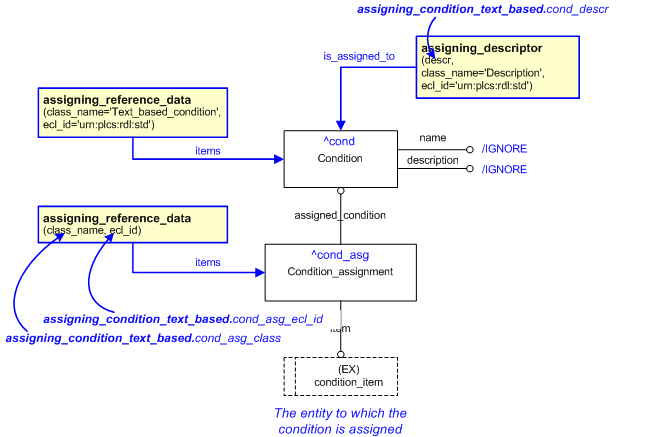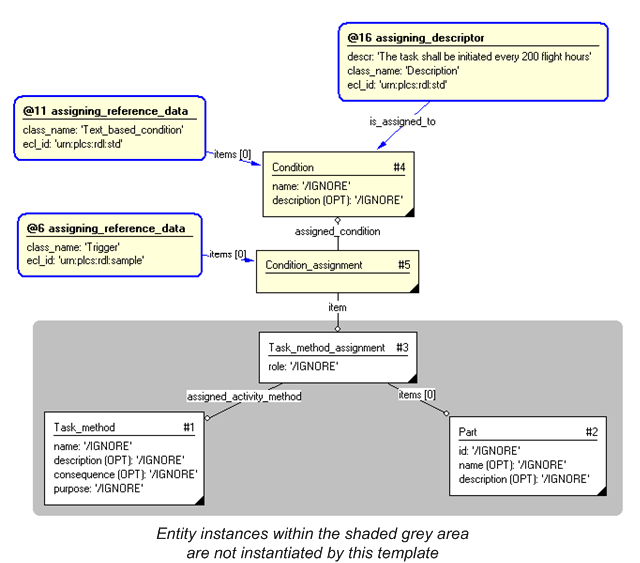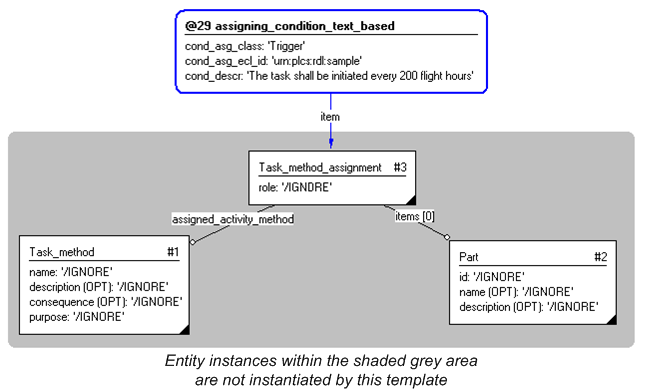Template:— assigning_condition_text_based (asg_cond_txt)
Capability:representing_condition |
Date: 2008/01/21 20:21:02
Revision: 1.10
|
This section specifies the template assigning_condition_text_based.
NOTE
The template has been defined in the context of the capability
representing_condition
which provides an overall description of the
relevant parts of the ISO 10303-239 information model and a description
of related templates.
NOTE
An explanation of a template and the associated instantiation path is
provided in the
Template overview
section.
This template describes how to assign a text based condition, i.e assign a non-computable condition
without condition parameters.
This template enables:
- the assignment of a textually described condition to something;
- classification of the assignment to define the role of the condition being assigned;
- classification of the condition as a text based condition.
The EXPRESS-G diagram in
Figure
1
shows the templates and EXPRESS entities that are required
to represent the template
"assigning_condition_text_based".
The text highlighted in blue shows the template parameters.
Figure 1 — EXPRESS-G representation for the template 'assigning_condition_text_based'
The graphic for the template to be used in other EXPRESS-G diagrams
is shown in Figure
2
below.
Figure 2 — Graphical representations for the template 'assigning_condition'
The following input parameters are defined for this template:
The name of the class used to classify the
Condition_assignment and to provide the role or reason
for the condition.
The following classes and their sub-classes can be used:
The identifier of the
External_class_library
storing the definition of the class referenced by the parameter @cond_asg_class.
Textual description of the condition being applied.
The following reference parameters are defined for this template:
Allow the
Condition
entity instantiated in this path to be referenced when this template is used.
Note: The
Condition
entity can be referenced in a template path by:
%^target = $assigning_condition_text_based.cond%
where
target
is the parameter to which the
Condition
is bound.
Allow the
Condition_assignment
entity instantiated in this path to be referenced when this template is used.
%^target = $assigning_condition_text_based.cond_asg%
The instantiation path shown below specifies the entities that are to be
instantiated by the template.
A description of templates and the syntax for the instantiation path is
provided in the
Templates Help/Information section.
The following entities are instantiated with attributes as specified:
The instance diagram in Figure
3
shows an example of the EXPRESS entities and templates that are instantiated by the template:
/assigning_condition(cond_item='#3', cond_asg_class='Trigger', cond_asg_ecl_id='urn:plcs:rdl:sample', cond_descr='The task shall be initiated every 200 flight hours')/
(an illustration of the consolidated assigning_condition template is shown in
Figure
4 below.)
The example shows a textual description of a task trigger being associated with a specific type of part.
Figure 3 — Instance diagram instantiated by the template example
The instance diagram in
Figure
4
shows the graphic symbol for the template that is to be
used in other instance diagrams. The example template is:
/assigning_condition(cond_item='#3', cond_asg_class='Trigger', cond_asg_ecl_id='urn:plcs:rdl:sample', cond_descr='The task shall be initiated every 200 flight hours')/
Figure 4 — Invocation of template - graphical presentation
The following section details how the
assigning_condition_text_based
template can be optionally characterized by assigning
other constructs to it. These are characterizations commonly
applied to the template. The ISO 10303-239 EXPRESS model may enable
other assignments to the entities instantiated by the template.
The following characterizations may apply:
Characterization Assigning description
NOTE this characterization is optional.
Characterization Assigning justification
NOTE this characterization is optional.




